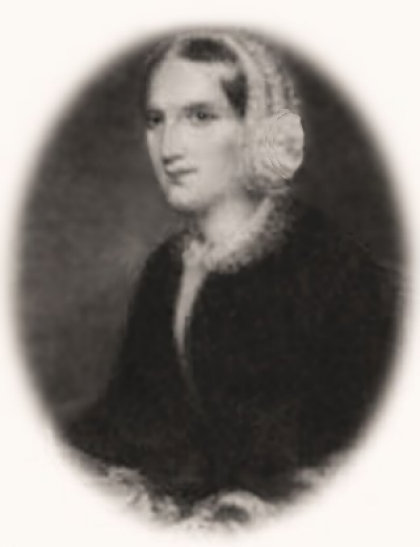Honoria Lawrence [née Marshall]
Lady Lawrence (1808-1854).

Honoria Lawrence was born
on 25 December 1808 at Cardonagh, Donegal, the twelfth of fifteen children of the Revd
George Marshall and his wife, Elizabeth. She was brought up by her uncle Admiral
Heath, who lived nearby, and was educated in a devoutly protestant environment; her
literary tastes and love of nature were both encouraged. She first met her future
husband, Henry Montgomery Lawrence (1806–1857), who was a cousin, on his return from
India in 1827. Despite their mutual attraction, he was deterred from proposing by his
lack of prospects; they finally married in Calcutta on 21 August 1837. She bore four
children, of whom two sons and one daughter survived. She was slight and lithe, with
fair hair and blue eyes, but her attraction lay in more than her looks: ‘She was not
beautiful in the ordinary sense of the term; but harmony, fervour and intelligence
breathed in her expression, emanating from a loving heart and cultured mind’ (Diver,
78).
Honoria Lawrence's maturity, independence, flexibility, and sense of humour helped her
face the demands of her husband's career as a soldier–administrator. She was always on
the move in north-western India, and was the first European woman to live in several
areas, including Kashmir and the independent state of Nepal. The difficulties of life
in these remote areas were considerable, particularly with regard to the birth and
upbringing of children. She recorded her life with perception and enthusiasm in
voluminous letters and journals, including those written for her two young sons at
school in England, selections from which were subsequently published. In these she
also reflects her ever-deepening appreciation and love of India.
However, while Honoria Lawrence later became known as a writer, contemporaries singled
out her invaluable role in supporting her husband in his career and other activities.
Her view of marriage and of the role of women marked her life in India. She was deeply
romantic, quoting Coleridge's view that an individual found his or her completion only
in another being. Nevertheless, as she wrote in an article in the Calcutta Review in
1845, she believed that a husband played the dominant role: ‘a wife is useful and
happy just in proportion as she can … identify herself with her husband … He has a
profession as well as a family; her profession is that of being a wife’ (Lawrence,
‘English women in Hindustan’, 100–01). She carried out her precepts with dedication
and enthusiasm. In the early months of their marriage she revelled in Henry Lawrence's
camp life as a surveyor, and assisted in his work. When he was placed in civil charge
of Ferozepore, she spent long hours helping run the post office, while in 1849–50 she
threw herself wholeheartedly into the professional demands of his life in Lahore,
where he was president of the board of administration for the Punjab. The Lawrences
shared a deep commitment to philanthropy, and Mrs Lawrence played a valuable part in
helping establish
near Simla the Lawrence Asylum for the children of soldiers, to provide a
boarding education in a healthy hill climate.
Writing became an important medium for the expression of Henry Lawrence's views on
Indian affairs, and here, too, Honoria Lawrence played an essential collaborative
role. She edited many of his articles on military and political matters for the Delhi
Gazette, which paper also published in instalments The Adventurer in the Punjaub, a
novel which she helped write, composing some of the romantic sections, including
poetry. More influential were the articles Henry Lawrence contributed from 1844 to the
newly formed Calcutta Review; these his wife edited, and in some cases co-authored.
Though she published little independently, several of her own articles dealing with
the female ‘profession’ of marriage and motherhood appeared anonymously in the
Calcutta Review and the Friend of India. She was sceptical about the performance of
British women in India, and was critical of their lack of concern for Indians and the
wives and children of British soldiers. Her success in fulfilling her own role was
attested by many. Her friend Lady Login commented:
I have never met a woman quite like Honoria, never a wife who more entirely shared in,
and helped, her husband in his work, yet without in any way bringing that fact to the
knowledge of the world at large. (Login, 63)
She became Lady Lawrence when her husband was knighted in 1848, following the First
Anglo-Sikh War. She died at Mount Abu in Rajputana on 15 January 1854, and was buried
there two days later.
Rosemary Cargill Raza
(LRMS Sanawar 1942-1947)
23 April 2002
With acknowledgements to: © Oxford University Press 2004–13. All rights reserved.
Rosemary Cargill Raza, ‘Lawrence , Honoria, Lady Lawrence (1808–1854)’,
Oxford Dictionary of National Biography, Oxford University Press, 2004
[http://www.oxforddnb.com/view/article/47680, accessed 14 Sept 2013]
Honoria Lawrence (1808–1854): doi:10.1093/ref: odnb/47680